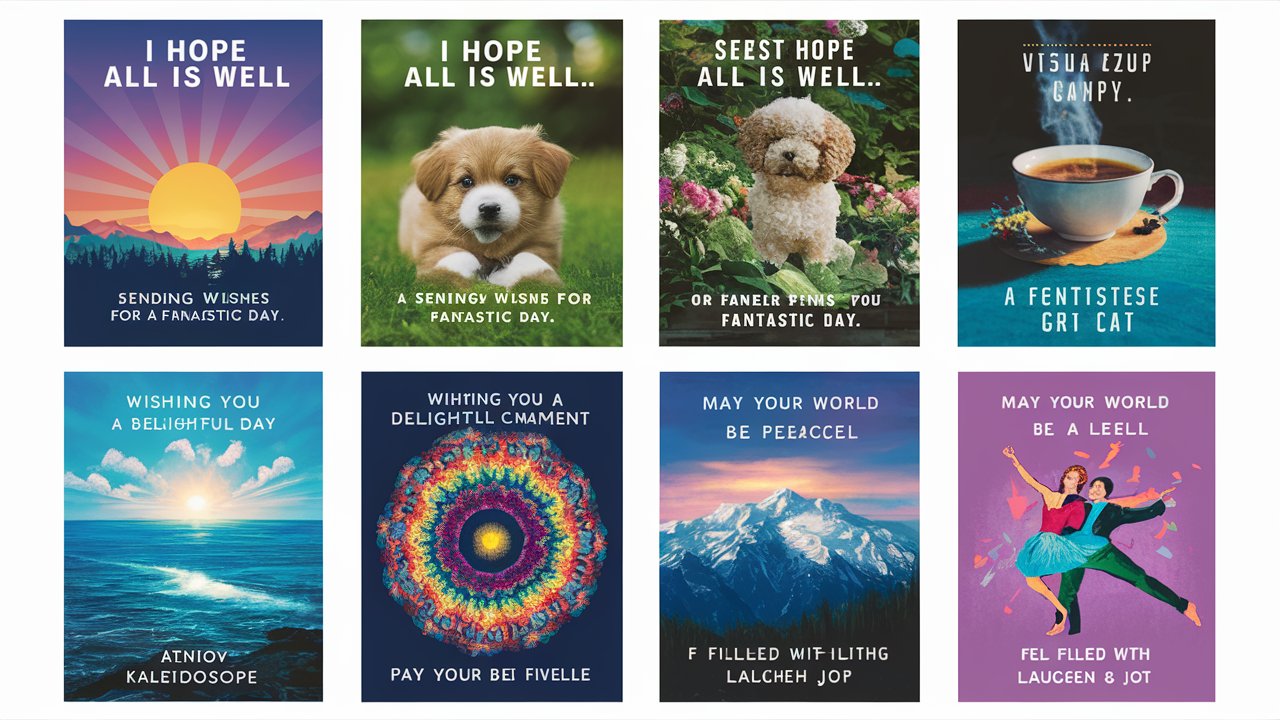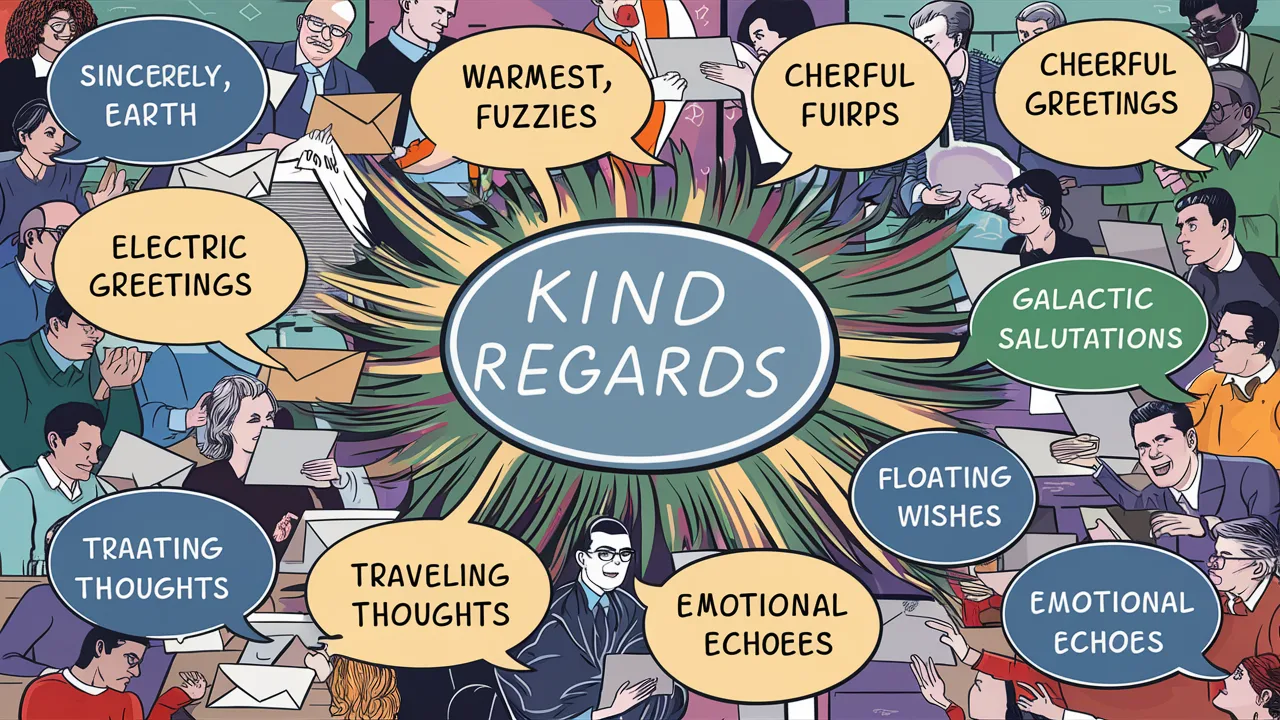Here are 8 refreshing alternatives to “I hope all is well” that you can use in work emails:
- How have you been recently?
- Is everything progressing smoothly on your end?
- How are things going in your world?
- What’s new and exciting with you?
- How is your week shaping up so far?
- Have there been any exciting developments in your projects?
- What challenges are you facing, if any, at the moment?
- How is the team dynamic working out recently?
These alternatives not only vary your vocabulary but also encourage a more personalized and engaging dialogue in professional communication.
In the realm of professional communication, where greetings often set the stage for interactions, phrases like “I hope all is well” have become as common as a morning cup of coffee. But just like that routine brew can start feeling bland after daily indulgence, these well-intentioned but overused expressions might be losing their spark.
Picture this: a sea of emails filled with generic niceties that sound more like automated responses than earnest inquiries. So why settle for the mundane when there’s an entire universe of engaging alternatives waiting to breathe life into your exchanges?
Let’s break free from the cookie-cutter constraints and dive into a refreshing exploration of innovative greeting alternatives that not only uphold professionalism but also infuse your communications with authenticity and warmth.
It’s time to shift away from the habitual script and embrace a spectrum of creative possibilities that cater to diverse relationships and situations. Join us on a journey where we challenge conventional pleasantries, empower you to express genuine care without clichés, and inspire you to forge meaningful connections through thoughtful gestures.
Welcome to a world where even professional greetings can sparkle with personality and purpose – let’s venture beyond “I hope all is well” together!
Why Avoid “I Hope All Is Well”
Have you ever received an email that starts with the all-too-familiar line, “I hope all is well?” While this greeting is commonly used in professional settings, its generic nature can have unintended consequences on building genuine relationships.
When we rely on cliché phrases like this, we risk diluting the authenticity of our interactions. Picture this: you receive ten emails in a day, all opening with “I hope all is well.” It becomes a script rather than a sincere inquiry into someone’s well-being. This overused phrase lacks personalization and often comes across as superficial, showing a lack of genuine interest in the recipient.
In professional relationships, leaning on such generic greetings can create distance rather than connection. Imagine meeting a client for the first time; instead of diving into meaningful conversations or expressing genuine care, you start with the same old line they’ve heard countless times before.
It’s like offering a handshake without looking someone in the eyes – it misses the mark of establishing a real connection. By avoiding the overuse of “I hope all is well,” you open up possibilities to communicate more authentically and deepen your professional relationships based on mutual respect and understanding.
When we veer away from these cookie-cutter phrases and take the time to craft more personalized messages, we demonstrate our commitment to fostering genuine connections. By understanding why it’s essential to avoid relying solely on “I hope all is well,” we empower ourselves to engage meaningfully with others in our professional sphere.
This shift from generic pleasantries to thoughtful communication not only sets you apart but also paves the way for more authentic and enriching interactions that leave a lasting impression on those you interact with.
Expressing Sincere Concern: Adopting Authenticity in Professional Communication.
In the realm of professional communication, authenticity shines brighter than generic pleasantries like “I hope all is well.” When you genuinely care about your colleagues, clients, or partners, expressing sincere concern becomes a catalyst for stronger relationships.
Instead of defaulting to robotic greetings, consider how meaningful connections can elevate your interactions. Picture this scenario: rather than sending a template email with standard well-wishes, imagine personalizing your message to reflect genuine empathy and understanding. This simple shift can create a ripple effect of positivity in your professional network.
To show genuine care without clichés, start by being present in your interactions. Listen actively when communicating and respond thoughtfully to demonstrate that you value the conversation. Acknowledge specific details shared by others and offer tailored responses that resonate with their experiences.
For instance, if a colleague mentions a recent project they’re struggling with, express authentic support by providing encouragement or helpful suggestions aligned with their challenges. By infusing sincerity into your exchanges, you transform routine communications into meaningful dialogues that leave a lasting impact.
Strategies to exhibit genuine care abound in the professional landscape; however, integrating them authentically requires intentionality. Embrace open-mindedness as you explore alternative approaches beyond conventional greetings.
Consider how small gestures like asking insightful questions or offering personalized advice can nurture authentic connections in your workplace relationships. Remember, authenticity breeds trust and fosters deeper bonds within your professional network.
As you navigate the nuances of expressing sincere concern without clichés, embrace the empowering journey of cultivating genuine connections through mindful communication practices.
Alternatives Focusing on Wellness.
As we seek refreshing alternatives to the standard “I hope all is well,” it’s crucial to move past superficial pleasantries and truly engage in meaningful communication. Expressing genuine concern for others’ well-being can make a significant difference in professional relationships.
Instead of generic wishes, consider offering supportive messages that go beyond surface-level sentiments. For instance, asking specific questions about how someone is coping with work challenges or personal situations shows a deeper level of empathy and understanding.
Incorporating wellness-focused alternatives into your interactions can create a more nurturing and authentic connection with your colleagues or clients. Empathy plays a key role in effective communication, fostering trust and rapport.
By acknowledging and addressing individual concerns or struggles, you demonstrate a level of care that transcends traditional greetings. For example, sharing resources related to mental health support or simply lending an empathetic ear can make a substantial impact on someone’s well-being.
When exploring alternatives that focus on wellness, consider how your messages can convey not just courtesy but genuine concern for the other person’s welfare. By incorporating empathy and understanding into your communications, you not only enhance the quality of your relationships but also contribute to a more supportive and compassionate work environment.
Remember, by showing sincere care through your words, you have the power to uplift others and foster connections built on kindness and compassion.
Tailoring Messages to Different Audiences.
When communicating professionally, one size does not fit all. Crafting personalized messages based on relationship dynamics plays a crucial role in establishing genuine connections.
For instance, when reaching out to clients, acknowledging their specific achievements or milestones can show that you value their partnership beyond just generic pleasantries. Similarly, understanding the different dynamics within your team can help tailor messages to inspire and motivate each individual uniquely.
Considering individual situations and emotions is where true empathy shines in communication. Suppose a colleague is going through a challenging time; instead of the standard “I hope all is well,” offering specific support or a listening ear demonstrates sincere care.
By recognizing and addressing the nuances of someone’s situation, whether it be celebrating successes or providing comfort during struggles, you elevate your communication from routine formalities to meaningful exchanges that nurture relationships.
By delving deeper into the nuances of professional interactions and understanding the varied emotions and circumstances at play, you pivot from surface-level greetings to tailored expressions that resonate with authenticity.
This approach not only strengthens bonds but also shows respect for the diverse experiences individuals bring to the table. Remembering birthdays, work anniversaries, or simply inquiring about personal interests can transform mundane exchanges into moments of genuine connection and rapport-building.
Injecting Positivity and Encouragement.
When it comes to communication, injecting positivity and encouragement can truly transform your interactions. Instead of the typical “I hope all is well,” consider uplifting phrases that spark motivation and morale.
For instance, you could say, “Wishing you a day filled with joy and accomplishment” or “May your week be as bright as your smile.” These alternatives not only set a more positive tone but also show genuine care and thoughtfulness.
By using these refreshing alternatives that go beyond traditional greetings, you breathe new life into your conversations. Thoughtful communication can create a ripple effect of positivity in professional relationships, boosting morale and enhancing productivity.
Imagine receiving a message that reads, “Your hard work does not go unnoticed; keep shining brightly!” Such words carry far more weight than generic well-wishes, fostering engagement and connection.
Incorporating encouraging language in your communications doesn’t just benefit the recipient—it also uplifts your own spirit. Choosing to spread positivity through your words cultivates a supportive environment where everyone feels valued and motivated.
By stepping away from conventional greetings and embracing empowering phrases, you elevate the energy within your interactions, leaving a lasting impression of warmth and encouragement. Let’s explore together how these small changes can make a big impact on personal and professional connections.
Combining Professionalism with Warmth.
In the realm of professional communication, striking a balance between upholding traditional etiquette and infusing warmth and personalization can be a game-changer in building authentic relationships. While maintaining professionalism is crucial, injecting genuine warmth into your interactions can elevate your rapport with colleagues, clients, and partners.
Imagine starting an email with “Wishing you a day filled with productivity and moments of joy” instead of the usual generic greetings—this simple shift can make all the difference. By adding a touch of personal warmth, you convey that you see the recipient as more than just a professional contact.
When combining professionalism with warmth, consider adapting your language to suit different contexts. For instance, when sending a follow-up email after a meeting, expressing appreciation for someone’s insights or acknowledging their efforts shows attentiveness and consideration beyond formalities.
It’s these small gestures that pave the way for meaningful connections. By using engaging language that resonates with the recipient on a personal level while maintaining appropriate boundaries of professionalism, you cultivate an environment of mutual respect and understanding.
Moreover, sharing relatable anecdotes or even light-hearted comments related to shared interests demonstrates that you acknowledge the person behind the title or position. This humanizes interactions and fosters a sense of camaraderie.
Picture signing off an email not only with “Best regards” but also including a sincere comment like “I hope your weekend hike brings you as much peace as it does me.” These personalized touches build bridges and create lasting impressions that go beyond mere business transactions.
By integrating warmth into your communication style thoughtfully and authentically, you forge connections that are not only productive but also fulfilling on a personal level.
Cultivating a Culture of Care in Business Interactions.
In the realm of business communications, fostering a culture of care can make all the difference in the way relationships are nurtured and sustained. Instead of resorting to generic well-wishes that often lack depth, consider infusing your messaging with empathy and genuine concern.
By promoting a supportive environment through thoughtful communication, you not only convey professionalism but also create lasting impressions that resonate with recipients. Imagine receiving a message from a colleague or client that goes beyond pleasantries – one that conveys a true sense of understanding and support tailored to your needs.
To cultivate this culture of care in your interactions, it’s essential to prioritize authenticity over formality. Think about incorporating personal touches into your messages that showcase your willingness to connect on a deeper level.
For instance, sharing relevant resources or offering genuinely helpful advice can transform a standard interaction into a meaningful exchange. By choosing compassionate messaging over generic phrases, you demonstrate a sincere commitment to building relationships rather than just going through the motions of professional courtesy.
By embracing this approach, you have an opportunity to stand out in your business interactions and leave a positive impact on those you engage with. Whether it’s through words of encouragement during challenging times or celebrating achievements with heartfelt messages, every interaction presents a chance to foster connections built on care and thoughtfulness.
Remember, creating lasting impressions isn’t just about what you say; it’s about how you make others feel through your words and actions in the professional sphere. Cultivating such an environment can lead to stronger bonds, increased trust, and a reputation for being someone who truly cares about others’ well-being in both work-related and personal contexts.
Elevating Your Communication Style.
As we wrap up our journey through refreshing alternatives to the overused “I hope all is well,” it’s crucial to understand that communication is more than just exchanging words—it’s about forming genuine connections. By embracing authenticity in your interactions, you have the power to transform mere greetings into meaningful exchanges that can deepen professional relationships.
Encouraging sincerity and thoughtfulness in your communication style not only sets you apart but also cultivates a space where empathy and understanding thrive. Remember, every message you send is an opportunity to connect on a deeper level with those around you.
By incorporating these alternatives into your daily interactions, you are not just communicating; you are actively building stronger connections through intentional gestures of care and concern. So, go ahead, explore these new avenues of expression, and watch as your relationships flourish with authenticity at the helm.
I am commitment to crafting compelling narratives and delivering insightful content continues to inspire and inform readers across various platforms. Explore her articles on AlternativesZone.com and FactAfterFact.com to experience a rich tapestry of knowledge and discovery. Here I Analyze and Test the products and services together with my team before we recommend them to our users. Nice Reading Here!








No responses yet